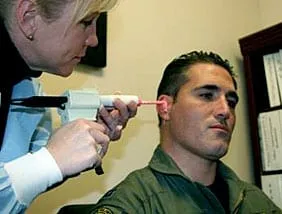This is how my day goes…
Me: “Good morning, My name is Dr. Javid and I am one of the staff audiologists.”
Patient: “What”
I hear the joke literally multiple times a week. But everyone does it because half of the world doesn’t know what an audiologist does and the other half knows that an audiologist helps people who can’t hear and they want to be funny.
Hearing is a vital aspect of our daily lives, and maintaining our hearing health is crucial for our overall well-being. Audiologists play a critical role in this process, and it’s essential to understand what they are, what they do, and how they differ from other hearing healthcare professionals.
Definition of an Audiologist
An audiologist is a healthcare professional who specializes in diagnosing and treating hearing and balance disorders. They have a master’s or doctoral degree in audiology and are licensed to practice in most states. Audiologists are experts in evaluating and treating hearing problems and are equipped to recommend and fit hearing aids and other assistive devices.
Importance of Audiology in Hearing Healthcare
They also provide hearing assessments and custom-fit hearing aids, as well as counseling and education on maintaining good hearing health. With the rise of noise-induced hearing loss and an aging population, the demand for audiologists and their services continues to grow.
Audiologists undergo extensive education and training to become licensed professionals in their field. They hold a master’s or doctoral degree in audiology and must complete a clinical fellowship to gain hands-on experience in diagnosing and treating hearing disorders.
Role and Responsibilities of Audiologist
The main responsibility of an audiologist is to identify and manage hearing and balance problems. Through thorough hearing evaluations, they assess the degree and nature of hearing loss and suggest suitable hearing aids, cochlear implants, or other assistive devices to enhance their patients’ hearing. In addition to providing counsel and instruction on hearing health, audiologists collaborate with their patients to optimize the performance of their hearing aids and related devices.
Services Offered by an Audiologist
Audiologists offer a range of services to diagnose and treat hearing and balance disorders. These services include:
- Comprehensive hearing assessments
- Evaluation and fitting of hearing aids using real ear measures and other assistive devices
- Treatment for tinnitus (ringing in the ears)
- Treatment for balance disorders
- Hearing conservation and protection
- Counseling and education on hearing health and maintenance
In summary, audiologists play a critical role in diagnosing and treating hearing and balance disorders. They offer a range of services to help improve their patients’ hearing health and ensure they receive the best possible care.
Audiologists are not ENTs and not Hearing Aid Specialists
| Audiologists | Hearing Instrument Specialists | Ear, Nose, and Throat (ENT) Doctors | |
| Education and Training | Clinical doctoral degree in audiology, clinical fellowship | Certification in fitting hearing aids, on the job training | Medical degree with the ability to prescribe medication and treat medical issues |
| Role and Responsibilities | Diagnosing and treating hearing and balance disorders, experts at hearing aid fittings | Selling hearing aids | Diagnosing and treating a range of ear, nose, and throat disorders, including hearing loss, and performing related surgeries |
| Services Offered | Comprehensive hearing assessments, fitting and adjusting hearing aids, real ear measurements, counseling, and education on hearing health and maintenance | Fitting hearing aids and hearing aid repairs. | Medical and surgical treatment options for ear, nose, and throat disorders |
While all three types of professionals play a role in diagnosing and treating hearing disorders, there are important differences in their education and training, role and responsibilities, and services offered. When choosing a healthcare professional for hearing concerns, it’s essential to consider your specific needs and choose the professional who is best equipped to help you.
I am a little biased, but I believe being fit with hearing aids from an audiologist will be your best option.

